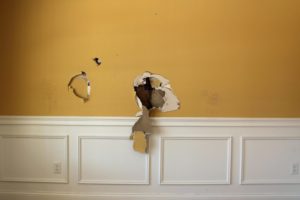
Perhaps you have been charged with a crime of criminal mischief in the state of Florida. In some cases, criminal mischief is also called vandalism, however, both terms mean the willful and malicious destruction of property that belongs to another. Whether you are charged with a misdemeanor or felony will depend on the level of damage to the property. In order to be convicted of criminal mischief, the prosecutor must show, beyond a reasonable doubt, that you:
- Committed damage to property;
- The damaged property belonged to another (identified) person, and
- The damage you committed was both willful and malicious in nature.
Our criminal defense lawyers in Sarasota offer free consultations. Contact us at our office in Sarasota, Florida, today at (941) 444-4444!
Elements of Criminal Mischief
The offense must have been committed intentionally, purposely, and knowingly in order to reach the level of “willful,” and must have been committed with no legal justification or excuse, and with the knowledge that injury or damage could potentially be caused to property or persons, to reach the level of “malicious.”
Because general intent is a necessary element of criminal mischief, meaning that, rather than a specific intent to injure or damage property, the offense only requires a willful and malicious act. However, while specific intent is not required for the offense of criminal mischief, your willful, malicious acts must have been directed at the property, rather than a person (even if a person was ultimately injured). Further, there must be evidence of damage to the property to obtain a conviction for criminal mischief.

Penalties Associated with Criminal Mischief in the State of Florida
Your penalties, should you be convicted of criminal mischief will depend on the level of damage to the property, however, the following are the potential penalties you could face:
- In situations where the damage to property is $200 or less, you will be charged with a second-degree misdemeanor, and, if convicted, will face up to 60 days in jail and $500 in fines;
- In situations where the damage to property is more than $200, but less than $1,000, you will be charged with a first-degree misdemeanor, and, if convicted, could face up to one year in jail and $1,000 in fines.
- In situations where the damage to property is more than $1,000, you will be charged with a third-degree felony, and could face up to five years in prison and $10,000 in fines.
 We’re here to serve you. Our phones are open 24 hours a day.
We’re here to serve you. Our phones are open 24 hours a day.
Defenses to Charges of Criminal Mischief
Your Florida criminal defense attorney will build a defense on your behalf based on the circumstances of your case, however, the following are some of the most common defenses to charges of criminal mischief:
- The damage to the property was not a result of your conduct;
- The alleged victim was not the actual owner of the property;
- The act responsible for the damage to the property was not willful or malicious, rather was an accident;
- The act responsible for the damage to the property occurred in the midst of an altercation, rather than being a willful act on your part;
- There was the legal justification for your conduct;
- The malicious act in question was directed to the person, rather than the property;
- Your conduct actually caused no damage to the property; and
- You engaged in the conduct that damaged the property as a means of protecting yourself or another person.
If you have been charged with criminal mischief in the state of Florida, you could benefit greatly from having an experienced Florida criminal defense attorney by your side from start to finish. The criminal attorneys at The Law Place will work hard to build a solid defense on your behalf, with the goal of minimizing the penalties you could face. Contact The Law Place today—call 941-444-4444.

